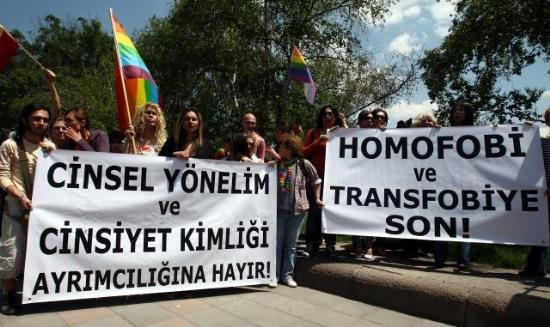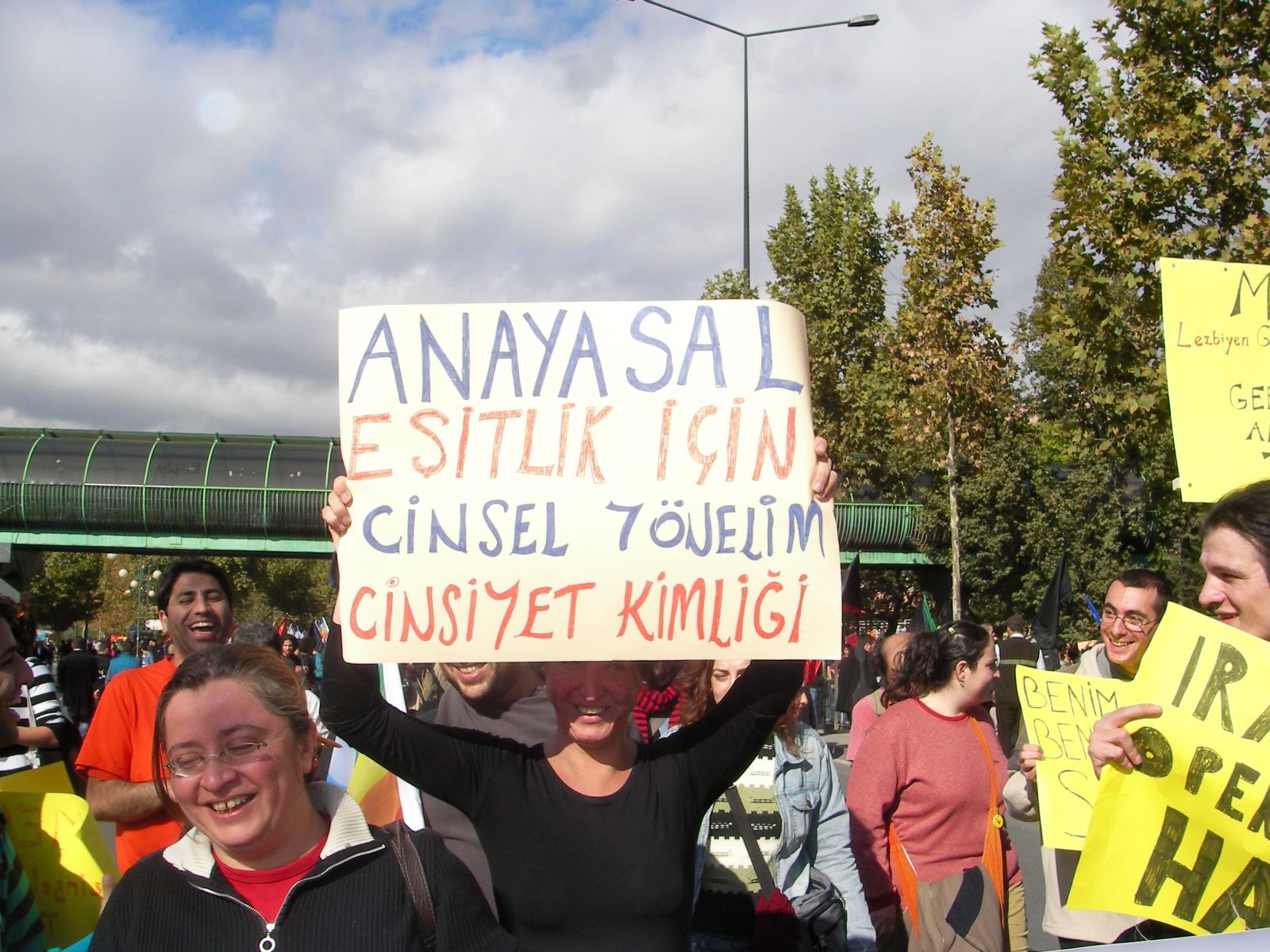02/04/2012 | Writer: Ali Erol
In pursuit of equality, Lesbian, Gay, Bisexual and Trans (LGBT) organizations demand that ‘sexual orientation’ and ‘gender identity’ be added to Article 10 of the Constitution of the Turkish Republic. This demand had long become an agenda topic before the recent flare up of debates over constitutional change.
In pursuit of equality, Lesbian, Gay, Bisexual and Trans (LGBT) organizations demand that “sexual orientation” and “gender identity” be added to Article 10 of the Constitution of the Turkish Republic. This demand had long become an agenda topic before the recent flare up of debates over constitutional change.
Ten years have passed since the demand for such a change first found its expression in the slogan “Amendment Bill to Article 10: Sexual Orientation!” that was chanted on the May Day March in Ankara. This was five years earlier than the topic of a “civilian constitution” was brought up in political circles.
As the constitutional debate gained momentum, the call for “Amendment Bill to Article 10: Sexual Orientation and Gender Identity!” has become “undebatable” for the prospect of constitutional “equality”, for which the LGBT organizations from all over have been collaborating.
While the debates on new constitution have been continuing since 2007 with ups and downs in popularity and intensity, a turning point has been reached: surpassing the collaborative efforts of the LGBT organizations, no constitutional proposition is now considered complete without the mentioning of “sexual orientation” or “gender identity”, be it made by women’s organizations, or labor unions and political circles who once watched the chanting LGBT people on that May Day March 10 years ago with baffled looks that said “what now, gays! where did that come from?”.
Although the AKP government had declared its determination to pass “a constitution that will include all divisions of society” as early as the initial stages of the new constitution movement since 2007 post-elective period, it was also made known that LGBT individuals were not to be included in the described “society”.
Tired of waiting for their turn to come in the endless list of hierarchy of rights, the LGBT organizations voiced their objection, saying that “in this society, there are not only heterosexuals, we too exist!”. The government’s declaration that “gays may well ask for equality, but we will not give them that” and the suggestion that the LGBT individuals wait for the 22nd century to come for equality was answered with a determined appeal: “we will not wait another hundred years for equality!”.

A Cry for Survival
Never giving up on their resolution to be an interested party within the “Civilian Constitution” movement, The LGBT organizations made another appeal for equality and freedom to the Speaker of the Turkish Parliament (The Grand National Assembly of Turkey). Organizations agreeing upon a common agreement that the demand made by LGBT individuals for constitutional recognition is a rightful demand in favor of “equality” and one in opposition to “discrimination” declared that a constitution which did not ensure the rights of LGBT individuals against discrimination on the basis of sexual orientation and gender identity could not be considered democratic or libertarian.
LGBT individuals have long been expressing that they have been ostracised, suppressed, denied fair participation and deprived of legal protection in every domain of life on the grounds of their sexual orientation and sexual identity. With the addition of violations of the right to live in the form of alarmingly increased hate murders committed against LGBT individuals, legal discrimination against LGBT people have reached such an unbearable level that the demands made by LGBT organizations for constitutional recognition now goes far beyond a desire to symbolically participate in the process; it becomes a cry for survival. The need for removing all impediments standing in the way of the democratizion of the process of creating a new constitution is true for LGBT as well; however, instead of a “road cleaning” getting rid off the discriminatory laws and practices, they have faced new “road accidents” in this process.
Before his current appearance as the head of the Parliament Constitution Negotiation Commission, Cemil Çiçek, The Speaker of the Parliament, had stood firmly against the inclusion of “sexual orientation” in the description of discriminatory acts when he was the Minister of Justice, which led to the removal of the term from the draft Turkish Penal Code. Similar interventions have been observed throughout the entire process of debates on the new constitution while, ironically, the government’s rhetoric which said that “participation from all divisions of society was sought after” was still in circulation. Expressions that were meant to provide protection for LGBT individuals from discrimination on the basis of their sexual orientations and sexual identities were taken out of “Draft Law on Anti-Discrimination and Equality” and “Aliens and International Protection Law Draft”.
Politicians’ Point of View
The shortcoming of current laws in providing protection for LGBT individuals as well as discriminatory practices against them are cited in a long list within the “Progress Report”, which is issued annually by the European Commission. In the report, it is stated that “The legal framework is not adequately aligned with the EU acquis, and in practice, discrimination is taking place against LGBT individuals”. The report also records Turkey’s nonobservance of the principle of anti-discrimination, reduced sentencing for perpatrators of homophobic violence, and the labor law that still needs to be amended.
When fundamental rights and freedoms that are unrecognized by the laws in action are even more restricted with prohibitions based on ambigious statements such as “public morality”, “national security”, “public order” and “protecting the structure of the Turkish family”. Consequently, discriminations faced by LGBT individuals not only add up to violations of their freedom of association and expression, but also go far beyond, making an equal and free life impossible for LGBT people.
The demand for constitutional recognition is LGBT people’s demand for being called with their name. At the initial stages of the constitutional debates even their name was anathema and any unavoidable reference to LGBT people was carefully made with deictic pronouns “they/them” uttered by the representatives of the AKP government in conscious attempts for othering LGBT people. Recovering from the shock of former minister Kavaf’s homophobic statements and trying to contact her successor Fatma Şahin, the LGBT community was hit by another blow coming from the Minister of the Interior, İdris Naim Şahin, who not only mentioned homosexuality among “dishonor, immorality and inhuman situations”, but also treated words describing LGBT people as profanities while he asked the audience to “kindly pardon his words”.

In the backdrop of such blatant state homophobia, LGBT people ask the government to stop treating their call for equality and freedom as a fantasy to be discarded with a few prejudiced gestures and they demand constitutional recognition. Like the Kurds who are seeking for equal participation and the Alawites who are demanding a sense of security, the LGBT community wants to put an end to be seen as the damaged goods to be sacrificed first in the case of a fire.
Translation: Murat Cömert
http://www.radikal.com.tr/Radikal.aspx?aType=RadikalEklerDetayV3&ArticleID=1075803&CategoryID=42
Tags:

